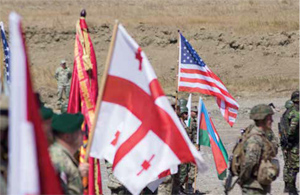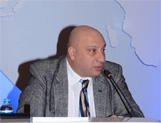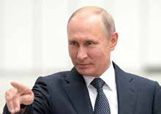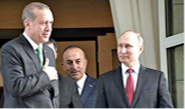NATO and Georgian–American Military Relations[Over]  By Eugene Kogan, Tbilisi-based defence and security expert By Eugene Kogan, Tbilisi-based defence and security expert
Since the 2003 Rose Revolution, Georgia has become a staunch and dependable non-NATO ally of the United States in the South Caucasus. Georgian-American bilateral military relations have become stronger and have climaxed in November 2017. With 870 soldiers per capita, Georgia is the leading donor of troops in Afghanistan. This is highly appreciated by the United States. READ MORE
- September 9, 2019 22:26PM
Romania Faces the Militarization of the Black Sea Region[Over]  By Greta K. Wagner, Student, University of Glasgow, Intern, The European Geopolitical Forum By Greta K. Wagner, Student, University of Glasgow, Intern, The European Geopolitical Forum
Russia’s annexation of Crimea in 2014 has profoundly impacted the military balance in the Black Sea. Amidst mutual distrust and conflicting insecurity perceptions, militarization has become the dominant security paradigm. Both Moscow and the NATO members in the region are steadily building up their military capacities and engaging in tit-for-tat defense enhancements. READ MORE
THAAD in Romania: Bucharest on the Moving Sands of Great Powers’ Competition[Over]  By George Vlad Niculescu, Head of Research, the European Geopolitical Forum By George Vlad Niculescu, Head of Research, the European Geopolitical Forum
On 11 April 2019, NATO confirmed US plans to deploy of the Terminal High Altitude Area Defense (THAAD) system to Romania. According to NATO officials, the United States will fulfil its commitment to NATO’s Ballistic Missile Defence by the temporary deployment of a THAAD system to Deveselu in Romania. The scheduled work is part of the United States European Phased Adaptive Approach to ballistic missile defence, which has been implemented since September 2009. In response, Russian Deputy Minister of Foreign Affairs Alexander Grushko said: “Russia is “closely following” the temporary deployment of a THAAD system to the Deveselu base in Romania.” READ MORE.
Security Trends in the Arctic Region and their Impact on Contemporary World Politics[Over]  By Nika Chitadze, PhD, Director, Center for International Studies, International Black Sea University, Tbilisi By Nika Chitadze, PhD, Director, Center for International Studies, International Black Sea University, Tbilisi
The melting of the Arctic ice cap in combination with developments elsewhere concerning future of energy and military security are creating scenarios that range from low level friction to potential conflict between the Arctic littoral states. Much attention has been devoted to maritime boundary disputes involving the Arctic states: Canada, Denmark, Norway, Russia, and the US. In addition to this, the emerging interest of non-Arctic states in shipping, polar research and non-living resources exploitation also adds uncertain elements to the Arctic geopolitical development. READ MORE
Armenian-Azerbaijani Talks on Karabakh Appear Positive Even as Conflict Continues to Simmer Underneath[Over]  By Eduard Abrahamyan, Wider Black Sea & Central Asia regional security analyst By Eduard Abrahamyan, Wider Black Sea & Central Asia regional security analyst
The foreign ministers of Armenia and Azerbaijan held four-hour-long consultations in Paris, on January 16, under the auspices of the Organization for Security and Cooperation in Europe’s (OSCE) Minsk Group. The joint statement to come out of the meeting included telling language. In particular, the two sides acknowledged the need for “concrete measures to prepare the populations for peace”. READ MORE
Withdrawal of the US Troops from Syria and its Impact on the Security Environment in the Black Sea Region[Over]  By Nika Chitadze, PhD, Director, Center for International Studies, International Black Sea University, Tbilisi By Nika Chitadze, PhD, Director, Center for International Studies, International Black Sea University, Tbilisi
As it is known, US President Donald Trump recently adopted a decision on the withdrawal of about two thousands American military serviceman from Syria. It is possible that one of the main purposes of the American contingent’s withdrawal is the restoration of closer relations between USA and Turkey and the prevention of strengthening cooperation between Moscow and Ankara. READ MORE
- February 23, 2019 21:51PM
Non-alignment Policy as a Principle of Shaping the National Security of Azerbaijan[Over]  By professor Sadi Sadiyev Saleh, War College of the Armed Forces, Republic of Azerbaijan By professor Sadi Sadiyev Saleh, War College of the Armed Forces, Republic of Azerbaijan
The emergence of a bipolar world and the formation of two military blocks (NATO and the Warsaw Pact) after the Second World War ushered in an intense rivalry between different countries. Finding an effective grand strategy to survive between two hostile powers inevitably requires a balanced policy. In this context, the underdeveloped countries felt the need to join efforts for the common defence of their interests, to strengthen their independence and sovereignty and to express a strong commitment for peace by declaring themselves as “non-aligned” from either of the two nascent military blocks. READ MORE
- February 14, 2019 20:25PM
Can Major non-NATO Ally Status Temporarily Solve Georgia’s Security Dilemma?[Over]  By Eduard Abrahamyan, Wider Black Sea & Central Asia regional security analyst By Eduard Abrahamyan, Wider Black Sea & Central Asia regional security analyst
Despite almost two decades of fanfare regarding Georgia’s pursuit to join NATO, the North Atlantic Alliance has yet to adopt a common position on the concrete timeframe of Georgia’s eventual membership. Given NATO’s protracted, uneven handling of Georgia’s enrolment process, might Georgia be better off seeking closer bilateral relations with the United States? READ MORE
- February 14, 2019 20:24PM
Russia’s Policy of Deception and Denial[Over]  By Eugene Kogan, Tbilisi-based defence and security expert By Eugene Kogan, Tbilisi-based defence and security expert
A policy of deception and denial is the cornerstone of Russia‘s overarching strategy of confusion, paralysis and ultimately defeat of the opponent.
Consistency, conviction and perseverance are key words to describe the policy of deception and denial. The cases presented below shed light on the consistent pattern of President Vladimir Putin’s government to deceive others and depict Russia as the one that comes to the aid of the underdogs, whether in Georgia, Ukraine or elsewhere. Syria is a special case where Russia cannot abandon its military bases to aggressive Western powers. READ MORE
The Regional Security Situation Remains Challenging in the South Caucasus[Over]
 By Benyamin Poghosyan, PhD, Executive Director, Political Science Association of Armenia By Benyamin Poghosyan, PhD, Executive Director, Political Science Association of Armenia
The South Caucasus is facing multiple security challenges with no clear path to overcome them in the foreseeable future. The conflicts in Nagorno-Karabakh, Abkhazia and South Ossetia are hampering any efforts to have an inclusive regional cooperation, and are the key reasons for the strained Russia - Georgia relations and absence of relations between Armenia, Turkey and Azerbaijan. Meanwhile, there are no immediately apparent ways to move towards the settlement of these conflicts. Russia deployed military bases in both Abkhazia and South Ossetia, and demanded from Georgia to accept the geopolitical facts on the ground. READ MORE
How Do Russian Loans “Help” Armenia to Modernize Its Military Capabilities?[Over]  By Fuad Sahbazov, Baku-based independent regional security and defence analyst By Fuad Sahbazov, Baku-based independent regional security and defence analyst
Armenia’s dependence on Russia makes it a pivotal foothold of Moscow in the South Caucasus, as the only host country of a Russian military base in the region, as well as a member in the Russia-led Collective Security Treaty Organization (CSTO), and the Eurasian Economic Union (EEU). While the growing arms race in the region and the recent escalation of tensions in Nagorno-Karabakh increased the vulnerability of Armenia, Russia seems to have reinforced its ability to ensure full control over Armenia. READ MORE
What Next in Syria?[Over]  By Benyamin Poghosyan, PhD, Executive Director, Political Science Association of Armenia By Benyamin Poghosyan, PhD, Executive Director, Political Science Association of Armenia
The April 14 US, UK and France joint strikes in Syria and the heated debates in the UN Security Council just before and after the military action once more emphasized the growing disagreements between Russia and the Western powers on Syria. However, the targeted and limited military strikes have no ability to alter the course of the conflict. Since the launch of the Russian military operation in September 2015, Syrian government forces, with the active support of Russian and Iranian units, have made tangible successes, including the establishment of full control over Aleppo and pushing back rebel groups from the suburbs of Damascus. READ MORE
Expect No Changes on the Karabakh Issue in the Next Year or Two[Over]  By Benyamin Poghosyan, PhD, Executive Director, Political Science Association of Armenia By Benyamin Poghosyan, PhD, Executive Director, Political Science Association of Armenia
On April 11, the incumbent President of Azerbaijan lham Aliyev was re-elected for his fourth term in office. Despite a boycott by the Azerbaijani opposition, as well as a tough assessment on elections from western observers, very few doubt that Aliyev will continue to rule in Azerbaijan. On April 9, Armenia finalized its transformation from semi-presidential system of government to a parliamentary one. The Parliament elected a new President - former Armenian ambassador in the UK Armen Sarkissian. His role defined by the new constitution is purely ceremonial. READ MORE
Could the EU and Russia Restore the Dialogue on European Security? [Over]  By George Vlad Niculescu, Head of Research, the European Geopolitical Forum
By George Vlad Niculescu, Head of Research, the European Geopolitical Forum
Most international analysts agree that Western relations with Russia are at their worst in thirty years, and that they are unlikely to improve unless significant geopolitical changes are going to emerge. More recently, a new academic debate has started on whether, and how, to restore the EU-Russia dialogue to meet the interests of both parties, while trying to reconcile respect for international law with principled pragmatism into creating a new European security architecture. It might be therefore worth looking at the prospects of restoring EU-Russia dialogue through the lens of security scenario planning. READ MORE
Russian-Turkish Relations and their Impact on NATO and the EU[Over]  By Eugene Kogan, Tbilisi-based defence and security expert By Eugene Kogan, Tbilisi-based defence and security expert
The Black Sea region is one of the regions in which Turkey has lost its influence to Russia. NATO and the EU have no influence on relations between Russia and Turkey, as NATO has no mechanism for excluding Turkey as a member state, while the EU, although it has implicitly suspended negotiations on Turkey's possible membership, it is not prepared to make a clear statement that Turkey will not join the Union in the foreseeable future. READ MORE
Iran and the US are slowly heading towards collision[Over]  By Benyamin Poghosyan, PhD, Executive Director, Political Science Association of Armenia By Benyamin Poghosyan, PhD, Executive Director, Political Science Association of Armenia
US attempts to change the provisions of the nuclear deal with Iran will intensify over the next months, but things are only likely to come to a head in 2019.
Since the election of President Trump, US-Iran relations have deteriorated significantly. The new US administration has ratcheted up pressure against Tehran threatening to withdraw from the 2015 nuclear deal, also known as JCPOA. The key members of President Trump national security team have accused Iran of supporting terrorism, sowing chaos in the Middle East, and creating a vast network of non-state actors vehemently countering US interests in the region. READ MORE
Armenia’s Karabakh Strategy, from Status Quo to Preemption[Over]  By Benyamin Poghosyan, PhD, Executive Director, Political Science Association of Armenia By Benyamin Poghosyan, PhD, Executive Director, Political Science Association of Armenia
The settlement of Nagorno-Karabakh conflict is the number one national security priority for Armenia. Armenia guarantees the security of the people of the Nagorno Karabakh Republic, having supported Karabakh during the 1992–94 war with Azerbaijan and through the years of cease-fire. Since 1994, Armenia has been involved in negotiation process in order to resolve the conflict with Azerbaijan. In recent years talks focused on the so-called Madrid Principles prepared by international mediators. Armenia accepted these principles as a basis for settlement and expressed willingness to sign a framework agreement during the summit in Kazan, Russia in 2011. READ MORE
Armenia, the Turkish Threat, and the Russian Antidote[Over]  By Benyamin Poghosyan, PhD, Executive Director, Political Science Association of Armenia By Benyamin Poghosyan, PhD, Executive Director, Political Science Association of Armenia
The Afrin events are being used to assert the notion that without Russian military guarantees, and a Russian military base deployed in Armenia, Yerevan will be under a constant threat from a potential Turkish offensive.
Turkey's military operation in Afrin proved once more that in the current geopolitical situation in the Middle East nothing can be excluded. Obviously, Turkey had made its own calculations when it launched the offensive, and the muted reaction of the main players of the region can be perceived as a proof that some preliminary discussions had taken place before the start of the operation. The nonlinear relations between powers involved in the Middle East makes it really complicated to understand what lies beneath the surface in terms of motives and assessments. READ MORE
- February 10, 2018 07:51AM
Kurdish region in turmoil[Over]  By Benyamin Poghosyan, PhD, Executive Director, Political Science Association of Armenia By Benyamin Poghosyan, PhD, Executive Director, Political Science Association of Armenia
There is uncertainty in Iraq's Kurdish Region after President Barzani's independence gamble misfires.
On September 25, 2017 Iraq's Kurdistan Regional Government (KRG) held an independence referendum with the overwhelming majority voting in favour of independence. The referendum was organized despite strong opposition from neighbouring Turkey and Iran, as well as Iraq's central Government, which called it illegal. Iraqi Kurdistan's decision to hold the referendum also in disputed territories, including the oil rich city of Kirkuk that have been under Kurdish control after the Iraqi army abandoned those territories as a result of ISIS advancements, caused further irritation in Baghdad. READ MORE
The New End Game (Part 1)[Over]  By Mehmood-Ul-Hassan Khan, EGF Affiliated Expert
By Mehmood-Ul-Hassan Khan, EGF Affiliated Expert
The new “end game” has been started by the national, regional and international power brokers. Shahid Khaqan Abbasi, who has been sworn in as the new Prime Minister of Pakistan, has already announced his priorities. He said there would be no load-shedding after November this year, and he pointed out that ten thousands megawatts of additional electricity will be added to the national grid. The completion of the ongoing mega-projects of energy in different parts of Pakistan would also be one of his national priorities. READ MORE
As relations between Russia-Turkey get evermore friendly, should Armenia be concerned?[Over]  By Benyamin Poghosyan, PhD, Executive Director, Political Science Association of Armenia By Benyamin Poghosyan, PhD, Executive Director, Political Science Association of Armenia
Turkey's decision to buy Russia's S-400 missile defence system opens a new stage in relations between the two countries.
Over the last two years Russia-Turkey relations have gone through tremendous transformations. Immediately after the November 2015 incident, when Turkish military jets shot down a Russian war plane, Russia imposed tough economic sanctions on Turkey and publicly accused President Erdogan of supporting terrorism, including "Islamic State". The situation dramatically changed in summer 2016 when Erdogan apologized for the November 2015 incident. READ MORE
Would have Russia found annoying the participation of Armenia in another NATO exercise?[Over]  By Benyamin Poghosyan, PhD, Executive Director, Political Science Association of Armenia By Benyamin Poghosyan, PhD, Executive Director, Political Science Association of Armenia
Armenia did not turn up for a NATO military exercise in Georgia as was expected. The most probable reason may be the attempt of Yerevan to avoid jeopardizing its strategic alliance with Russia.
On September 3rd, NATO's Agile Spirit 2017 military drills were launched in Georgia with the participation of Georgian, US, Ukrainian, Romanian, Bulgarian, Latvian and Azerbaijani troops. Armenia was among the countries due to participate, but cancelled its involvement although the Armenian Ministry of Defence issued a statement on September 4th saying that Armenia had never decided to take part in that exercise. READ MORE
- September 20, 2017 20:03PM
Little Hope for a Negotiated Solution to the Karabakh Conflict in the Short-Term[Over]
 By Benyamin Poghosyan, PhD, Executive Director, Political Science Association of Armenia By Benyamin Poghosyan, PhD, Executive Director, Political Science Association of Armenia
Armenian and Azerbaijani societies continue to prepare for war despite the prospect of a presidential summit in the autumn. The best-case scenario is a continuation of low intensity conflict along the line of contact.
On July 11, 2017, the Armenian and Azerbaijani foreign ministers met in Brussels for another round of negotiations on the settlement of the Karabakh conflict. According to the available information no breakthrough has been reached. READ MORE
NATO and Turkey continue to need each other[Over]  By Benyamin Poghosyan, PhD, Executive Director, Political Science Association of Armenia By Benyamin Poghosyan, PhD, Executive Director, Political Science Association of Armenia
In recent months, Turkey has been facing increasing difficulties with key NATO member states. The United States' growing reliance on Syrian Kurdish forces in Syria as a key force capable of effectively fighting Islamic State and US President Donald Trump's decision to arm Kurdish YPG units placed additional strains on bilateral US-Turkey relations, which have been sharply deteriorating since the July 2016 military coup and with Turkey's unsuccessful efforts to organize Fethullah Gulen's extradition from the US. READ MORE
Armenia Takes Leading Position in CSTO[Over]  By Benyamin Poghosyan, PhD, Executive Director, Political Science Association of Armenia By Benyamin Poghosyan, PhD, Executive Director, Political Science Association of Armenia
An Armenian general is now at the helm of the CSTO military alliance. This may prove to be a double edged sword for Armenia.
The South Caucasus is one of the battlefields in the current Russia-West confrontation. As a part of the former Soviet space, the region is perceived by Russia as an area of its legitimate "special interests." For the West, including the United States, NATO and the EU, the view of the region is defined by its role as a key transit route for Caspian energy resources to reach Europe circumventing Russia, and as an important gateway to exert influence in the nearby Middle East. Regional geopolitical competition is further complicated by the onset of Iran and Turkey. READ MORE
|
|